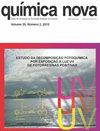SEMICARBAZONAS: SEQUÊNCIA DIDÁTICA INTERDISCIPLINAR EM AULAS EXPERIMENTAIS DE QUÍMICA ORGÂNICA E QUÍMICA MEDICINAL
IF 0.5
4区 化学
Q4 CHEMISTRY, MULTIDISCIPLINARY
引用次数: 0
Abstract
SEMICARBAZONES: INTERDISCIPLINARY APPROACH IN EXPERIMENTAL CLASSES OF ORGANIC CHEMISTRY AND MEDICINAL CHEMISTRY. Considering the chemical and pharmacological properties of semicarbazones, an interdisciplinary didactic sequence was developed to be applied in experimental classes of undergraduate courses in Pharmacy, Chemistry and related areas. This didactic sequence was planned in three steps, starting from the planning of the target molecule, a semicarbazone derived from helional, to its synthesis, physicochemical characterization (CCD, melting point, FTIR and UV-Vis) and in silico tests of its pharmacokinetic properties using the free software ADMETlab 2.0. The proposed target molecule has as molecular scaffold the 1,3-benzodiaxole nucleus and the semicarbazone function, aiming to obtain a molecule with promising anticonvulsant action and that can be obtained by a low cost and easy to execute methodology, which makes it attractive for use in experimental classes. Thus, the application of this didactic sequence aims to provide undergraduate students the opportunity to experience the process of drug development, applying techniques for planning, synthesis, characterization, and pharmacokinetic evaluation in silico. Besides reinforcing the interdisciplinary teaching of Medicinal Chemistry, applying in an integrated way the theoretical and practical knowledge of the disciplines of Organic Chemistry, Physical Chemistry, Pharmacology and Computational Chemistry.氨基脲:有机化学和药物化学实验课堂的跨学科教学顺序
氨基脲:有机化学与药物化学实验课的跨学科方法。考虑到氨基脲类化合物的化学和药理学性质,我们开发了一个跨学科的教学序列,用于药学、化学和相关领域的本科课程的实验课。该教学序列计划分为三步,从目标分子(从螺旋衍生的氨基脲)的规划开始,到其合成,物理化学表征(CCD,熔点,FTIR和UV-Vis)以及使用免费软件ADMETlab 2.0对其药代动力学特性进行硅测试。所提出的目标分子以1,3-苯二氮唑核和氨基脲为分子支架,旨在获得具有抗惊厥作用的分子,并且可以通过低成本和易于执行的方法获得,这使得它具有在实验课上使用的吸引力。因此,该教学序列的应用旨在为本科生提供体验药物开发过程的机会,并在计算机上应用计划、合成、表征和药代动力学评价技术。在加强药物化学跨学科教学的基础上,综合运用有机化学、物理化学、药理学、计算化学等学科的理论与实践知识。
本文章由计算机程序翻译,如有差异,请以英文原文为准。
求助全文
约1分钟内获得全文
求助全文
来源期刊

Quimica Nova
化学-化学综合
CiteScore
1.60
自引率
12.50%
发文量
72
审稿时长
2-4 weeks
期刊介绍:
Química Nova publishes in portuguese, spanish and english, original research articles, revisions, technical notes and articles about education in chemistry. All the manuscripts submitted to QN are evaluated by, at least, two reviewers (from Brazil and abroad) of recognized expertise in the field of chemistry involved in the manuscript. The Editorial Council can be eventually asked to review manuscripts. Editors are responsible for the final edition of QN.
 求助内容:
求助内容: 应助结果提醒方式:
应助结果提醒方式:


